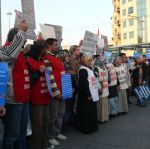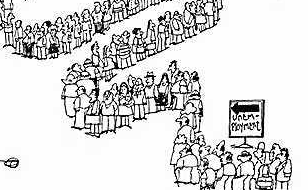"The phase of capitalism was already creating unemployment in Turkey. Before the recent crisis, official figures of unemployment were at 2,4 million people, which reached 4,6 million according to other estimates. The economic crisis has affected this but we shouldn't pin the responsibility on it alone. The recent trends of unemployment are based on capitalism itself, rather than the agricultural sector or an increasing population. Capitalism creates unemployment where production is mainly based on imported technology and relative surplus value and capital accumulation is increasing."
Professor Fuat Ercan of Marmara University, comments on World Bank chair Robert Zoellic's recent evaluations, where he draws attention to a threat of "humanitarian crisis" resulting from poverty caused by ongoing crisis.
Three trade union confederations gathered 40 thousand people in Istanbul yesterday, where they criticized government policies and refused to "pay the price of the economic crisis."
In addition to that, Turkish Institute of Statistics (TUIK) announced unemployment rate has steeply increased in November 2008. Latest figures reveal 645 thousand people joined the jobless masses, taking the figure to a total of 3 million. Moreover, methods of calculation employed by the institute are disputed and some academics put figure much higher.
Ercan emphasizes several points with regard to the government and capitalists' approach to ongoing crisis:
- The government is trying to fulfill capitalists' demands, planning to lower taxes, promoting flexible work and further underestimating employers' responsibilities towards workers. Despite all that, capitalists want more and more.
- Using unemployment funds to subsidize employers' taxation responsibilities in return for holding employment means transferring public sources to private capital. This is not in the interest of the masses.
- The crisis is not just used to excuse unemployment, but also curtailing social rights such as public health services and education.

















